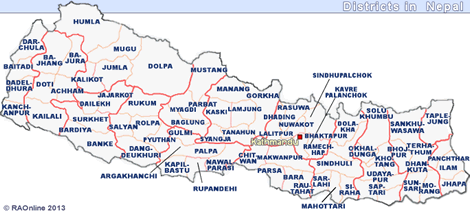|
|
 |
Basic
Information |
|
|
 |
 The
Maoist rebels number an estimated 600 commandos,
9,500 hard-core Maoists (regular troops) and 25,000 civil militiamen (RNA
source: 2005). The
Maoist rebels number an estimated 600 commandos,
9,500 hard-core Maoists (regular troops) and 25,000 civil militiamen (RNA
source: 2005).
 According
to UNMIN the Maoist Army has 19,602 registered members (Source:
UNMIN 2007). According
to UNMIN the Maoist Army has 19,602 registered members (Source:
UNMIN 2007).
 According
to an estimation, the security forces number 85,000
RNA soldiers and 57,000 armed policemen. According
to an estimation, the security forces number 85,000
RNA soldiers and 57,000 armed policemen. |
It
is expected to reach 150,000 in the next five years. This doesn't
include the 20,000 paramilitary Armed Police Force. The army says it ideally
needs a 800-strong battalion posted to guard each of the 75 district headquarters,
but has to make do with a company of 200 soldiers for each.
In
2005, soldiers are commandeered from Division Headquarters in the five
development regions and the Kathmandu Valley Division. Though the RNA's
strength has crossed 85,000, it has to reach at least 100,000 in order
to form the Army 's Corps in the eastern and western regions.
Nepalis
caught in the middle have fled their villages by the hundreds of thousands.
The country's military budget has increased at least three times more than
peacetime levels. Most of the money has been diverted from development
projects. Weapons are getting more sophisticated.
The
Nepalese Army NA said the rebel army includes about 4,000 to 6,000 hard-core
combatants, backed by up to 25,000 militia carrying improvised weapons
and explosive devices.
see
also: Government forces
Nepalese
Army
NA |
M-16s,
Insas machine guns , Belgian Mini machin guns, heavy-caliber mounted machine
guns, self-loding rifles, mortars, mine-clearing vehicles, helicopter gunships
with night vision ability .... and more. |
People's
Liberation Army
PLA |
AK-47s,
AK-56s, homemade shotguns, mortars, rocket-popelled grenades, RDX explosives,
bombs and mines made of pressure cookers an tin cans, land mines, Self-Loading
Rifles (SLRs), .303 rifles, mortars, bombs, INSAS rifles, sub-machine guns,
Chinese, American and Indian pistols, shot guns, revolvers, grenades, detonators,
muskets, socket bombs, pipe bombs... and more.
 Registration
of combatants and weapons 2007 Registration
of combatants and weapons 2007
|
| PLA |
July
2006
A
PLA commander stated that the the People's Liberation Army has about 36,000
fighters at present time. Nepali security officials believe that the
Maoist forces have an estimated number of 15,000 well-equipped combatants.
The Maoists had about 30,000 weapons, mainly seized from the security
forces. The combatants are backed by tens of thousands of full-time
political cadres.
 Registration
of combatants and weapons 2007 Registration
of combatants and weapons 2007
|
top
Government
Forces |
June
2006
| Government's
troop strength |
With
an estimated strength of just 80,000 soldiers in the Nepalese Army (NA), 17,000 personnel in the Armed Police Force (APF) and a poorly equipped Police
Force comprising 47,000 personnel. The
Maoists have an estimated strength of between 8,000 to 10,000 well-armed
and trained 'regulars', an additional 25,000 (on conservative estimates)
'militia' armed with relatively primitive weapons such as pipe guns
and crude bombs, backed by a substantial number of 'sympathisers', officially
estimated at about 200,000 in 2003, who can, under certain circumstances,
be mobilised ? voluntarily or coercively ? for violent action. The current
strength of 144,000 men in all state Forces cannot even provide a fraction
of a minimally acceptable counter-insurgency Force ratio, which would have
to exceed at least 1:10, and would approach a desirable (though far from
optimal) level at 1:20.
Source:
SATP 2006 |
|





